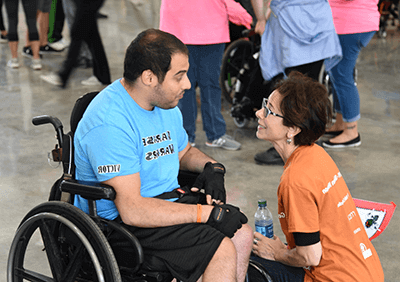NJCAT – The NJ Comprehensive Assessment Tool

Assessing the support needs of individuals with developmental disabilities eligible for DDD services
As part of the Division of Developmental Disabilities’ move to a Medicaid Fee-for-Service system, they have introduced a new assessment tool for determining eligibility and needed level of support. The NJ Comprehensive Assessment Tool (NJCAT) must be completed by all individuals over the age of twenty-one who are applying for services and individuals who are about to turn twenty-one (should be completed in the fall/winter of the last year of school). THE NJCAT must also be completed by all individuals currently receiving services as part of a reassessment required for the move to Fee-for-Service.
The NJCAT includes two parts – a functional criteria assessment, which determines whether an individual meets the criteria for DDD services and the Developmental Disabilities Resource Tool (DDRT) which evaluates the level of support needed by the individual in areas such as:
- Mobility and physical abilities
- Medical issues
- Behavior
- Self-care
- Communication
- Independent living skills
- Social/Emotional
- Employment
- Natural supports
Completion of the NJCAT will determine the level of funding that the individual will receive under either the Supports Program or the Community Care Program.
The NJCAT may be completed by the individual, a family member or a responsible person who spends a significant amount of time with the individual as well as personally assisting the individual with their support needs. There are two options for completing the NJCAT. It can be completed online (a password protected link is required) or over the phone with a representative of the Developmental Disabilities Planning Institute (DDPI) who is responsible for conducting all assessments on behalf of DDD.
To prepare to complete the assessment, individuals or their representative can view a sample assessment. There is also a webinar available, Completing the NJ Comprehensive Assessment Tool. The webinar presents a brief, general overview of the assessment and how to prepare to complete it. The NJCAT is a critical step in assisting an individual with accessing sufficient funding (budget) to meet their support needs.
It has been ingrained in parents throughout the school years, and in service providers as well, to focus on what an individual can do not what they can’t do, to concentrate on the positive qualities of an individual. That approach should not be employed when completing the NJCAT since it may lead to an inaccurate portrayal of the actual abilities and challenges of the individual. When the completing the NJCAT it is extremely important to answer the assessment questions with a firm grasp of the stark realities of an individual’s needs and skills. The individual or their representative must employ a critical and factual view of the challenges that an individual faces while living their lives.
One way that has been proposed to think about the individual’s needs in a realistic way when answering the assessment questions, is to frame responses and think each question through as if the individual is alone in the world without the support of family or designated caregivers. For example, if asked a question such as the following, what must you consider?
- Can they feed themselves? – Can they prepare the food, feed it to themselves, clean up, shop for food, select appropriate foods?
- Can they take a shower? – Can they undress, adjust the water, wash themselves, use appropriate products, dress in appropriate clothes?
- Can they make their bed? – Can they remove dirty and put on clean sheets, know when sheets should be changed?
- Do they know their daily routine? – Can they get through a day without prompting and direction, do they know what day it is and what happens on that day, do they know what they need to participate in or complete an activity?
- Can they care for their home? – Can they do dishes, use a vacuum, clean the sink and tub, know what should be cleaned when and with what product?
- Can they direct their own care? – Can they verbally tell someone what they need, how to complete a task, when they’re hungry, thirsty, sick?
Many of the questions in the NJCAT may seem difficult to answer since they do not allow for other than a yes or no response. For example: “Is [name] comfortable being part of a group — or does he/she find it uncomfortable to be a part of a group?” Perhaps the individual is comfortable in small groups but not in large ones. However, the only responses provided are “comfortable/uncomfortable”. The best approach to take when faced with any question, and especially ones where neither response is totally accurate, is to think about the individual on their most challenging, difficult day before selecting a response.
Another point to keep in mind is that the individual may be functioning better than they did four or five years ago, but it is important to consider how they function as compared to an individual with typical abilities of the same age. For an example, a twenty-one year old may now be able to button their own shirt or put on their own shoes, but the average twenty-one year old may have just graduated from college and be able to not only care for themselves but support themselves as well.
Upon completion of the NJCAT, the individual will be notified of their tier assignment. If the individual does not live with their guardian, the guardian will be sent a copy of the assignment letter. (See blog posts on the Supports Program and the Community Care Program for a list of funding levels that correspond to each tier.)
Reassessment for all individuals will be completed every five years. If an individual experiences changes in his support needs before that time or believes that the original assessment was completed improperly, a request for a reassessment can be submitted to [email protected] or by mail to NJ Division of Developmental Disabilities, PO Box 726, Trenton, NJ 08625-0726, ATTN: NJCAT Reassessment Unit. The individual’s support coordinator can supply the necessary paperwork and assist with this process.
The introduction of the NJCAT as a new assessment tool for DDD services is an attempt to create a single, standardized format that will be used for all individuals seeking supports. For more information on the NJCAT, DDD has included a Resource Page on their website.



